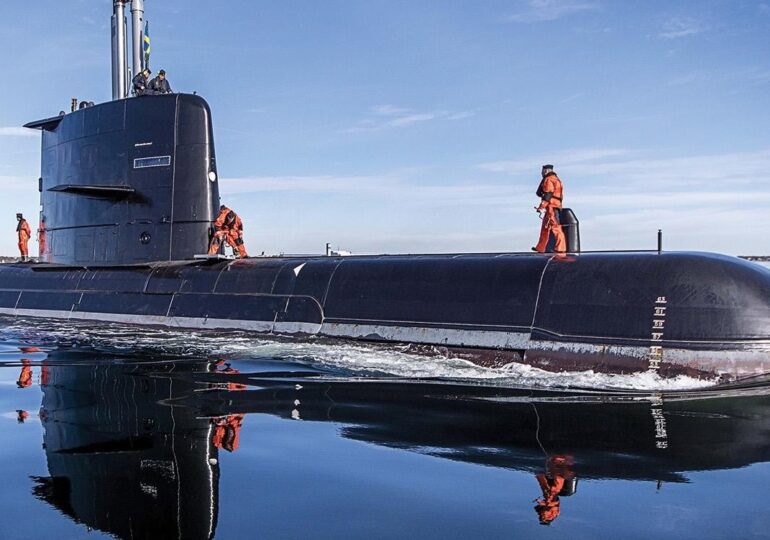The hidden submarines of Sweden are essential for strengthening NATO’s defense in strategic waters. Small and silent, they can remain submerged for long periods of time and are ideal for the Baltic Sea.
Sweden, NATO’s newest ally, has „unique capabilities to bolster the alliance,” said Pål Jonson, the Swedish Minister of Defense to Business Insider.
He highlighted Sweden's "subarctic capabilities," referring to Swedish submarines operating in the Baltic Sea.
After decades of neutrality, Sweden joined NATO in March 2024, in response to Russia's invasion of Ukraine. Its military has been largely built with a perpetual threat from Russia in mind, and now is one of the many European countries warning that Russia could attack elsewhere on the continent, not just in Ukraine.
The Swedish Navy operates three advanced diesel-electric submarines of the Gotland class and a fourth older one set to be retired when replaced by two new models, starting in 2027.
Although lacking nuclear propulsion like American submarines, they are quite capable and have demonstrated their effectiveness in naval exercises conducted with allied forces.
In the event of a conflict, with Sweden now part of the alliance, NATO will be in a much better position in the Baltic Sea than Russia, due to the concentration of power around the sea and the ability of these ships to close the sea to Russian activities, said Professor Basil Germond, an expert in maritime security at the University of Lancaster in the UK, as cited by the publication.
A Swedish submarine "sank" an American aircraft carrier in an exercise
Swedish submarines are small, silent, and can remain submerged for long periods. These characteristics allowed them to "defeat" an American aircraft carrier, vessels quite well defended, in a military exercise.
HSMS Gotland "sank" the USS Ronald Reagan aircraft carrier in a 2005 anti-submarine exercise involving a confrontation between the Swedish vessel and an operational transport group.
Sweden operates conventional submarines of the Gotland class, which Steven Horrell, a former US naval intelligence officer now an expert in naval warfare at the European Policy Analysis Center, described as "even quieter than an American nuclear submarine."
Bryan Clark, a former submarine operator and naval operations expert at the Hudson Institute, described Swedish submarines as very silent. "That means they can operate undetected. They can patrol areas like the Baltic Sea in particular, without enemy forces knowing they are there," he explained.
Clark considers these submarines "a great asset" for NATO.
Many NATO allies around the Baltic Sea have much smaller maritime capabilities. Commander of the Swedish submarine fleet, Fredrik Linden, told Reuters in 2023 that the Swedish navy possesses "regional expertise that fills a critical gap, expertise that NATO does not have."
Jonson said that Sweden has "unique capabilities to operate in the Baltic Sea underwater, on the surface, and in the air."
Swedes "know the Baltic Sea inside out"
Sweden is well acquainted with the Baltic Sea. "It's something we've been doing for hundreds of years, and we like to think we know the Baltic Sea inside out," said Jonson.
Located in northern Europe, the Baltic Sea is surrounded by Russia and NATO allies, Denmark, Estonia, Finland, Germany, Latvia, Lithuania, and Poland, and is strategically important for both NATO and the Russians.
The war in Ukraine, which Russia started with the intention, among others, to limit NATO expansion, has turned the Baltic Sea into what some alliance members have called a "NATO sea" after Finland and Sweden joined the North Atlantic alliance.
In the war in Ukraine, Russia used warships and submarines to launch missiles at cities and critical infrastructure. However, Ukraine managed to destroy many of Russia's ships using its naval drones, driving the Russian fleet away from the Black Sea from its Crimean stronghold.
This has left St. Petersburg as one of the few Russian ports that do not become inaccessible in winter. If Russia were to threaten Europe, the Baltic Sea could become a strategically important battlefield.
For NATO, maintaining a higher maritime deterrence posture in the Baltic Sea is essential.
What Swedish submarines can do
The Gotland-class submarines have a notable age but have repeatedly benefited from upgrades to maintain their top combat capabilities.
Swedish military vessels feature a unique air-independent propulsion system, powered by Stirling cycle external combustion engines, an X-rudder for enhanced maneuverability, four heavy torpedo tubes, and two light torpedo tubes.
These submarines remain hidden and can attack enemy surface ships and submarines, as well as mines. Horrell considers them "perfect for a sea with small islands and shallow waters."
Clark said that Sweden tends to "primarily operate in that region of the Baltic Sea, the North Sea, with relatively shallow waters and many small fjords and entrances."
Sweden usually focuses on "submarines and coastal warfare," while Finland focuses more on combating maritime threats, with equipment such as mine layers, he added. The two allies "could effectively pin down Russian forces in Moscow's waters," the expert further stated.
Nordics invest in Defense
Swedish submarines can also be useful in deterring maritime sabotage operations. Western officials have expressed concern about Baltic Sea security in response to the cutting of submarine cables.
Sweden is strengthening its defense by acquiring more surface ships. Other allies are doing the same. Denmark is purchasing several dozen ships amid increasing threats in the Baltic and Arctic Seas.
Sweden and many of its neighbors warn that Russia could attack elsewhere in Europe beyond Ukraine. The Stockholm government has increased defense spending and wants allies to do the same. "We've doubled our defense investments in five years, and now we're at 2.4% of GDP with a trajectory that goes even further," said Pål Jonson.
T.D.

